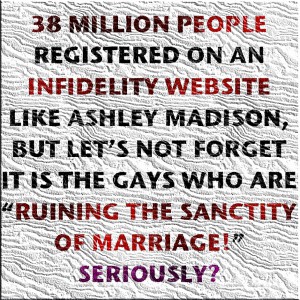

Oh, I used that word as a title. That should have captured your interest. Sorry, it’s not going to be that “exciting”, in fact, it is about our perceptions in regards religion, gender and relationships. You can stop reading if you were looking for something titillating. Aside from my silhouettes alongside here, there will be no more, OK?? If you are willing to continue, then read on.
Sexuality is a minefield of opinions and issues. Sex, who you have it with, what gender they are when you have it, and why and how your indulging. For some reason we all want to know what is going on in everyone’s bedroom, behind closed doors, so we can – more often than not – pronounce judgement on it. Sex as “private” and “sacred” and “sacrosanct” is just not well respected.
The involvement of the larger community in censoring who we may love and what choices we make behind closed doors with willing partners is an invasion on personal choices that borders on the voyeuristic sexual preoccupations of the “peeping tom”. Our unwillingness to concede to the legitimacy of marriage equality despite so many choosing to live, cohabitate, raise children and all but exist without the trappings of legal civil title and it’s legal and social protections, is failing to recognise how a whole community chooses to live. It’s an attitude of sweeping it under the carpet, in the hope that it all goes away and ignoring that it is a social phenomenon that has been present since time immemorial.
For the sake of five words
The impediment to the recognition of marriage equality in Australia is five unique words in the Marriage Act. The words “two people” will replace “man and woman” and the words “husband and wife” so that the act then reads: “the union of a two people to the exclusion of all others, voluntarily entered into for life“. That’s it! No more. It does not force religious ministers to conduct same-sex weddings, and they have the right of choice to refuse as their conscience dictates. It does mean that priests who do wish to, have the right of choice to accept too. There is no conspiracy to change what the church chooses to do. It’s not about religion as I will explain later. There is equally, no denying the choice of what two people decide to do in proclaiming publicly in celebrating their love for one another and has that civilly recognised in Law.
The slippery slope?
The statutes around the age of consent remain unchanged. It says, “two people”, not animals or any combination of either, Cori Bernardi. There is no “deviant sex” approved. No paedophilia legitimised. There is no slippery slope to tumble down towards all the nonsense things many conservative thinkers think this is falling. Changing the three words “Man and woman” to “two people” does not open the doors to any of that. The door remains firmly closed to all of Senator Eric Abetz’s or Cori Bernardi’s more vivid (and frankly disturbing) imaginings.
Is Marriage treated as “holy”?

As for affecting heterosexual marriage, how exactly? Let’s face it what heterosexual marriage is “a union between a man and a woman, to the exclusion of all others, for life” in contemporary society? Adultery and divorce are as common as they are, the vows of “marriage” are hardly being exalted as holy and as reverently as they who are outraged – at the possibility of the scope being inclusive to Gay couples – pretend it is. If the straight community is discarding the permanency or exclusiveness of marriage both under the civil definition and under the church’s definition, by what right do they hold to the propriety, that it is the exclusive realm of only being for the opposing sexes? Would not the focus of the Church be better served in fulfilling the promises they make as a community in your typical service? Shouldn’t they seek to help the stability and harmony of the few marriage relationships they have that want to maintain the “exclusion” and “voluntarily entered into for life” agreement? Is that not a vision of compassion, support and justice that the church upholds? So why only for Christian marriage and not other forms of marriage?
Which marriage?
What of the Christian community and their idea of marriage. Putting aside for a moment failure rates in that community and focusing on the ideal. Rev Rod James in a paper to the Uniting Church (historically the most pro-gay church in Australia) noted in his opening statement “For Christians, human marriage is grounded in Christ.” And so it should be “For Christians”, why not … isn’t that the faith? Changes to the legislation as proposed do nothing to change that. They require nothing of the church at all. That Rev Rod want to describe Christian Marriage as “ontologically heterosexual” is not denied by the legislation. It is after all “the legal” not “the spiritual” definition of marriage that is being invoked in this debate, although many confuse the two. He is perfectly entitled to not marry a couple within the confines of his church now and after the proposed legislative change.
Marriage as the legal concept is the subject and this “marriage” does not belong to the Church. Why carry on as though it is exclusively the domain of the church? Marriage as an idea, a ceremony, a joining of souls that pre-dates the church and has existed in one manner after another within numerous pagan and religious societies. Yes, Christians marry! So do pagans and atheists, so why not the LGBTQ community? You don’t see Christians outraged that Atheists have subverted their sacred ceremony and have chosen to be “married”. In all probability, they actually may not want to be married in a church anyhow. Rev. Rod wants the Uniting Church to continue to have it that “Marriage for Christians is the freely given consent and commitment in public and before God of a man and a woman to live together for life“. [my emphasis] Absolutely! Why not? Good on him. It is, after all, a statement of their faith and commitment to one another. The debate here, although, should be focused on “Marriage for other people…“!
And the rest of us?
Other people, includes pagans, non-Christian religions, agnostics, atheists and the LGBTQ community. If legal marriage allowed that later community into the fraternity that they have fought so long for, then might it not be a witness to the larger community (Christian or otherwise) of what marriage should be? Perhaps what the Gay community can offer – that “straight marriage” is not – is to be showing us how a couple can stay together and is willing to “fight and struggle for love”. That struggle for them now is to have the right to declare their love for one another recognised legally. In a world where heterosexual Marriage falls apart faster than the wrapping around the “pass the parcel” gift at a toddlers party, perhaps there are some lessons the Gay community could teach us about “exclusion” and “voluntarily entered into for life“. Just a thought.